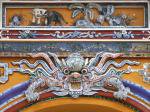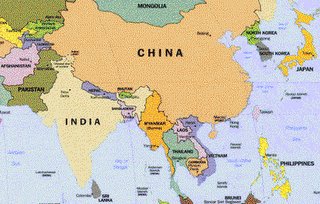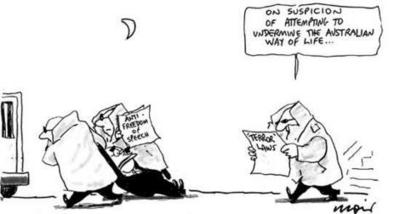When the Oil-for-food scandal first began to break, blame was laid at the feet of Saddam and the UN for all the corruption, with criticism especially vitupritive from the Bush administration, Fox News and like-minded cheerleaders. There was certainly blame enough to spread there, too, fair cop. But there would have been no corruption, notwithstanding the best efforts of Saddam or the worst efforts of the UN, without the willing and facilitating participation of business (much of it French and Russian), some of which is finally being "outed". (http://guambatstew.blogspot.com/2005/10/bad-saddam-bad-kofi-and-shame-on-rest.html) You might also cast your mind back to the Bush administration's handling of FEMA and the NOLA experience (e.g., http://guambatstew.blogspot.com/2005/09/buck-doesnt-stop-its-lying-in-wait-for.html). Bear that in mind whilst reading the following.WASHINGTON (Reuters) -
Corruption continues to cost Iraq billions of dollars each year, and Washington and Baghdad should be doing far more to stop it, the top U.S. auditor for Iraq's reconstruction said in a report released on Sunday. Stuart Bowen, special inspector general for Iraq reconstruction, said U.S. efforts to help Iraq build strong anti-corruption institutions were urgently needed and called for an American-Iraqi summit to battle a legacy of corruption. "Creating an effective anti-corruption structure within Iraq's government is essential to the long-term success of Iraq's fledgling democracy," Bowen wrote in his seventh quarterly report to Congress.
"Bowen's office, which has 20 auditors and 10 investigators in Iraq plus staffers in the United States, has made
significant progress on cases charging fraud, bribery and kickbacks involving U.S. citizens -- government officials and contractors -- in Iraq, he said. The report said investigators had gathered "an enormous amount of evidence" in these investigations but gave no details on any possible indictments. Bowen said his office, created by Congress in November 2003 to oversee the Iraq Reconstruction and Relief Fund, recently transferred $2 million to the Justice Department to fund prosecution efforts, and four prosecutors were now working full-time on Iraq reconstruction cases. He said it was crucial for the United States to strengthen Iraq's new domestic anti-corruption agencies, noting that
Iraq lost more than $2 billion each year in stolen gasoline and diesel fuel supplies. The report said Iraq's Bureau of Supreme Audit charged that
up to $1.27 billion from some 90 contracts was lost from June 2004 to February 2005 because deals were given to "favored suppliers" and cash was given to third-party firms to work out contracts."Overall, the report said the United States had made steady progress in its $30 billion drive to rebuild Iraq, billed as the biggest U.S. foreign aid operation since the post-World War Two reconstruction of Europe."
http://today.reuters.com/news/NewsArticle.aspx?type=topNews&storyID=uri:2005-10-30T211014Z_01_KRA076157_RTRUKOC_0_US-IRAQ-RECONSTRUCTION.xml&pageNumber=1&summit="As the money runs out on the $30 billion American-financed reconstruction of Iraq, the officials in charge cannot say how many planned projects they will complete, and there is no clear source for hundreds of millions of dollars a year needed to operate the projects that have been finished, according to a report to Congress released on Sunday. The report, by the special inspector general for Iraq reconstruction, describes an array of projects that went awry, sometimes astonishingly,
like electrical substations that were built at great cost but never connected to the country's electrical grid. With more than 93 percent of the American money now committed to specific projects, it could become increasingly difficult to solve those problems. Issues like those "should have been considered before," said Jim Mitchell, a spokesman for the inspector general's office. "It's very critical right now, with so little of the U.S. money left to be committed, that they're going to have to make these determinations very quickly."
"Overall, the report says, there have been 4,208 death and injury claims filed through the insurance coverage that United States law requires for contractors of any nationality who work on American bases abroad. Although that number includes claims from bases around the world, the majority are believed to originate from Iraq and Afghanistan. Those death and injury tolls, which in the chaos of Iraq are probably underreported to begin with, especially among Iraqi contractors, have come about even though more than a quarter of the reconstruction money has actually "been spent on security costs related to the insurgency," the report says. The security costs have "proportionately reduced funds for other reconstruction projects," the report continues, leading to the cancellation of many initiatives.
"We welcome and value the independent oversight," said a spokeswoman for the State Department, which now largely oversees the rebuilding effort. "Their objective findings have helped improve transparency, accountability and efficiency as we work with the Iraqi people to establish an independent, stable and prosperous Iraq." The five electrical substations examined by the inspector general's office, which is led by Stuart Bowen Jr., were built in southern Iraq at a cost of $28.8 million.
"The completed substations were found to be well planned, well designed and well constructed," the report says. Unfortunately, the system for distributing power from the completed substations was largely nonexistent. "No date for installing the distribution system was given," the report says."http://www.iht.com/articles/2005/10/30/news/rebuild.php"BASRA, Iraq — Laura Bush's gift to the people of Iraq is rising in a dirt lot across from a sheep market here, hidden behind high concrete walls and towers with armed guards. Behind the walls, hundreds of Iraqi workers in blue jumpsuits scurry around a construction site filled with rebar, dirt and trailers. The project, funded by the U.S. government and donations raised with the first lady's help, will someday be a hospital equipped to treat pediatric cancer patients.
Nobody denies that Iraq needs new hospitals, but the experts questioned the priorities of Washington's $1-billion rebuilding plan, which has focused on construction instead of basic needs such as better training for doctors and public healthcare campaigns.
"We have more important priorities to solve our urgent health problems," said Abdulamir Khafaji, the chief pediatrician at Basra's largest hospital, citing the need for additional equipment in his emergency room. Meanwhile, the number of clinics to be built has been reduced because of security costs and other problems.
It is uncertain whether Iraqis will be able to staff and maintain the health centers that are being constructed.
"The U.S. spent funds on equipment that is now sitting in warehouses and on medications that later disappeared, presumably stolen, according to interviews and federal reports. Iraqis and health experts said more attention should have been paid to refurbishing the country's dilapidated network of 1,700 clinics and nearly 200 hospitals. A 2004 survey of 214 clinics found that only 10% had a regular water supply, only half had electric generators, and less than a third had "functional and relatively clean" toilets. "I saw enormous
incompetence which was more costly than even Iraqi corruption," said Richard Garfield, a Columbia University health expert who worked with U.S. and international officials in Iraq last year.
The U.S. "was pouring money down the drain."
"To improve things, the U.S. issued a $43-million contract in April 2003 to Abt Associates Inc., a Massachusetts-based consulting firm, to modernize the Iraqi Health Ministry and provide needed supplies. But the company, which has worked on healthcare issues throughout the developing world, quickly ran into problems, according to an audit issued this year by the USAID inspector-general. Company officials were slow to mobilize. They bickered with Iraqis and officials with the Coalition Provisional Authority, the U.S.-led agency that administered Iraq until June 2004. One Abt manager "did not recognize" the CPA as a "legitimate authority," the audit said. Medical kits intended for 600 clinics contained damaged or useless equipment, the audit said. USAID subcontractors questioned the quality of a device that Abt bought to sterilize medical tools, noting that it was manufactured by an Indian firm that hadn't made such an appliance before. The medical kits, which were supposed to be purchased by October 2003, weren't delivered to the warehouse until June 2004, eight months late, the audit said. By February 2005, some clinics still had not received the kits. One subcontractor involved in delivering the equipment said he had "never witnessed such a debacle" in 20 years of working with USAID, the audit said. The audit also criticized USAID officials for constant turnover and failing to move quickly to address problems. In the end, USAID officials cut Abt's contract, paying it only $23 million. Abt officials refused to comment, referring all questions to USAID.
"By the time the Abt contract expired in November 2004, the U.S. already had a new approach to improve healthcare: building and refurbishing hundreds of clinics and hospitals. In March 2004, the Pentagon's reconstruction agency, now known as the Project and Contracting Office, announced
the award of a $500-million contract to Parsons Corp., based in Pasadena, to build 150 clinics and refurbish 20 hospitals and other facilities. But violence flared in Iraq that month, causing security costs to soar. Parsons had to relocate its headquarters inside the heavily fortified Green Zone in Baghdad and limit trips around Iraq. The U.S. recently cut eight clinics from construction plans, citing security costs. The refurbishment project also became mired in landownership disputes, problems with Iraqi officials demanding kickbacks and poor performance by Parsons' Iraqi subcontractors, State Department officials said. The first of the new clinics is supposed to be complete by the end of this year. Parsons referred questions to the government. In contrast to the delays that have beset other construction projects, Basra Children's Hospital is on track to open its doors in September 2006 — 3 1/2 years after the invasion. That may be in part because of the intense interest shown by Laura Bush and Secretary of State Condoleezza Rice."
http://www.latimes.com/la-fg-iraqhealth30oct30,0,1723256.story?page=2&track=morenews&coll=la-story-footerSomewhat related post: http://guambatstew.blogspot.com/2005/09/waging-war.htmlLabels: Government bungles, Military industrial complex, Politics of wealth, Procurement

 seems patently premature, and the risks on the horizon for the Chinese polity – and hence for economic stability – highly underestimated.
seems patently premature, and the risks on the horizon for the Chinese polity – and hence for economic stability – highly underestimated. s, call-center operators, and back-room programmers supposedly hollowing out white-collar jobs in rich countries? The total number of workers in all possible forms of IT-related jobs in India comes to less than a million workers – one-quarter of one percent of the Indian labor force. For all its Nobel Prizes and brilliant scholars and professionals, India is the largest single-country contributor to the pool of illiterate people in the world. Lifting them out of poverty and dead-end menial jobs will remain a Herculean task for decades to come.
s, call-center operators, and back-room programmers supposedly hollowing out white-collar jobs in rich countries? The total number of workers in all possible forms of IT-related jobs in India comes to less than a million workers – one-quarter of one percent of the Indian labor force. For all its Nobel Prizes and brilliant scholars and professionals, India is the largest single-country contributor to the pool of illiterate people in the world. Lifting them out of poverty and dead-end menial jobs will remain a Herculean task for decades to come. regulatory structures in both countries are still slow and heavy-handed. According to the World Bank, to start a business requires in India 71 days, in China 48 days (compared to 6 days in Singapore); enforcing debt contracts requires 425 days in India, 241 days in China (69 days in Singapore)."
regulatory structures in both countries are still slow and heavy-handed. According to the World Bank, to start a business requires in India 71 days, in China 48 days (compared to 6 days in Singapore); enforcing debt contracts requires 425 days in India, 241 days in China (69 days in Singapore)."



















